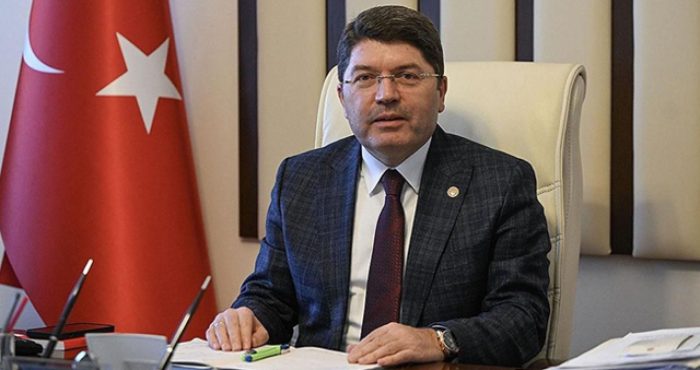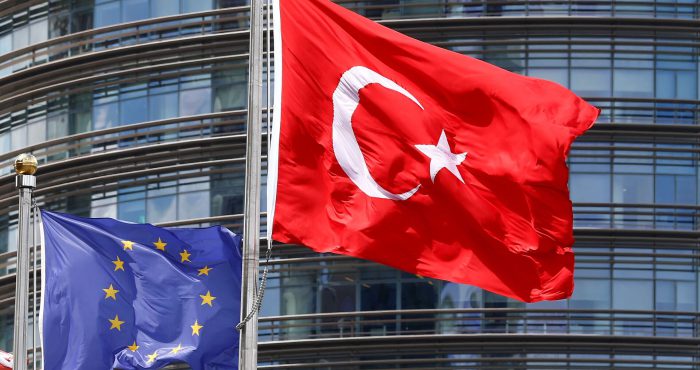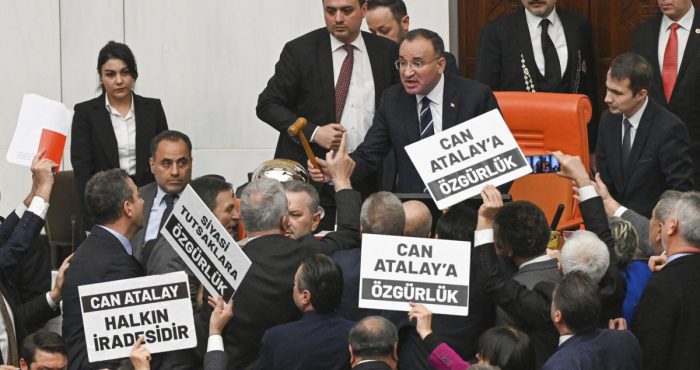While Republican People’s Party President Kemal Kılıçdaroğlu’s question “Are you with me?” is posed broadly, to party members and non-party members alike, it is akin to a dog-whistle, implicitly addressing more specific groups both within and beyond the party. The CHP leader’s question indicates that there are at least three such groups: those who support him, those who oppose him and those who damage him by not making their stance clear. It is conceivable that the third group, who cause “harm” with their actions, did not fully support his candidacy because of certain concerns. However, the fact that he asked the question after his speech shows that this very short text and simple question was carefully prepared, and that the three segments of the audience were identified carefully.
It would be best for our country if Mr. Kılıçdaroğlu were to listen to these three groups without prejudice in an environment where they can express themselves freely and sincerely, to understand why he is supported, why he is opposed and what people’s concerns are, and to reconsider his candidacy.
Renewal or retirement preparation?
In Turkey, the political scene, the order of game, the roles and even the lines have remained the same—and outdated—for far too long. The old players need to renew the stage and the game, and the white-bearded ones should retire to their corner and leave the stage to new players. Kılıçdaroğlu, who has made special efforts to bring the İYİ Party to the political fore, and who formed the Nation Alliance and the Table of Six, is trying to reach the polarized segments of society by giving and receiving blessings, increasing the minimum wage and excluding taxes, canceling small debts, and similar outputs, which indicates that such a renewal in politics may be one of his goals.
However, the fact that his proposal for a “Strengthened Parliamentary System” (GPS), which he is not solely responsible for but has been instrumental in forming, is only about the formation of the executive in parliament, i.e. who will form and dissolve the government; that it does not offer a solution to the anti-democratic delegation, central management and election problems in political parties; and that he lashes out at three groups that he wishes to be in unity with him—all of this points to his desire and candidacy to become a super-authorized president in the current problematic system before he retires from politics.
Partisans cannot think objectively
The supporters not only of the opposition but also of the government, including Kılıçdaroğlu himself, should assess the presidential candidacy of Kılıçdaroğlu, or anyone, by putting aside their personal desires, ambitions and calculations, as well as those of their parties and candidates. In this assessment, the sole and fundamental objective must be to do what is best for the future of the whole country, our children, our grandchildren and their grandchildren, and how best to realize short-, medium- and long-term benefits.
However, as with everything else, it is almost impossible for supporters and opponents to act rationally and without prejudice, setting aside their personal interests, even on this crucial issue. Thinking rationally and without prejudice from a neutral stance can only be achieved by wise people who have reached a deep level of maturity, and by opinion leaders who are impartial, who have no personal interest and who can look at the issue from the perspective of the common good.
The most fundamental problem needs to be solved first
The steps taken by the government with the aim of reducing the current account deficit and foreign debts by increasing exports while restricting imports by cheapening the labor force and making foreign currency more expensive, thus getting richer in a similar way to China, lacking a proven and scientific basis in experience, have enriched the small segment of society that exports or owns businesses, while rapidly reducing the income and welfare of the low-income segment of society living on wages.
Economic experts and the opposition, who criticize the deviation from known scientific methods, worry that Turkey is falling off an economic and governance cliff and is at risk of becoming akin to a South American country in economic terms.
As changes are being made to the system of state governance in our country that are reminiscent of the decline of the Ottoman Empire, and as secular and religious ideas of governance, the seeds of which were sown then, clash, our country has become polarized, and the fault lines of social fragility have deepened and multiplied. It is becoming increasingly difficult to find common ground and to reconcile opposing ideas and their supporters.
Economic problems are essentially the result of the clash of secular and religious ideas as each side tries to score points from the other. Therefore, lasting economic recovery is only possible with deep-rooted solutions to these issues.
Lessons for the new Constitution
Turkey needs a civilian constitution that will ensure the effective participation of the people in the administration, the limitation of powers through effective judicial oversight, and the transformation of politics from a place of position and benefit to a place of service to the people.
The civilian constitution should be drafted by consensus among the vast majority of society, while politicians should only lead the process. The civil constitution, which should end polarization and divisions in the process of being drafted, should ensure social consensus on fundamental issues such as justice, foreign relations, education, security, health and taxation.
Anyone running for the Presidency should focus on this fundamental task—that is, solving fundamental social issues through consensus and implementing the civil constitution that the country deserves.
Our country is one of the most independent countries in the world, united and in order; we are not in a state of disorganization or slavery as described in the Kül Tigin inscriptions. The problems of determining Turkey’s identity and not knowing what to do, which the Ottoman Empire faced in the 19th century as it gradually collapsed, were solved 100 years ago by Atatürk and his comrades-in-arms in the founding of modern Turkey.
Candidates for the Presidency, who already have wide-ranging powers and direct control over almost every institution in the country, should make plans and commitments to help us as a nation to learn lessons from the country’s history over the last 100 years, and to build a system that will not cause problems for decades to come.
Mr. Kılıçdaroğlu’s candidacy:
(a) is appropriate because of the trust he has built through his contribution to the formation of the Nation Alliance and then the Table of Six. However, if he is elected president, it is not appropriate because of the possibility of big cracks appearing in the table, and the possibility of the table falling apart.
(b) is appropriate as he has promised a more democratic transformation of the state structure by signing the proposal for a return to the Strengthened Parliamentary System (GPS), and he has promised to work together with other political parties. However, the proposal is inappropriate due to its crude nature, the fact that the design is not watertight and it is still unclear what kind of state structure it proposes, and the risk that, due to its many shortcomings and weaknesses, it could lead us back to the era of unstable, vicious coalitions at the very time that we are seeking stability in state governance.
(c) is appropriate because of his GPS proposal to increase the effectiveness of parliament in state administration, his promise to allow parliament to dissolve governments when necessary, and his promise to enact a law on political ethics, even though he has yet to publish a draft of it. However, the GPS proposal, put forward by the consensus of six different parties, is not suitable because it does not contain a methodology that will ensure social consensus on fundamental social issues such as justice, foreign relations, security, education, health and income inequality, on which Turkey has traditionally swung from one extreme to the other. A situation where it is not clear what the CHP’s Plan B will be in the absence of this, and where it is not clear what the CHP’s Plan B will be if it is elected, may create new swings rather than a balance.
In spite of being a staunch advocate of democratic governance and promising full democracy, Kılıçdaroğlu has no theory or proposal on how to transform social dynamics into a separation of powers. Given the shallowness of academics who produce syntheses and solutions, it is not possible and correct to fill this deficiency with the advice of consultants and the like, and therefore his candidacy is not appropriate.
While it is a great achievement that he has put the issue of justice on the agenda of the country and the world with his spectacular March for Justice, Mr. Kılıçdaroğlu has not provided sufficient guidance to make a directional choice about the common problems of the judiciary in the national and international arenas, the root causes of the problems in Turkey, nor has he put forward radical solution proposals. The proposal to separate the HSK into the Council of Judges and the Council of Prosecutors, and to elect half of the members of the Council of Judges from within the Parliament, could yield worse results than the current system. Moreover, it is not clear what will replace the functions of the HSK, which will be abolished, in producing and regulating judicial services. It is unclear what will happen to the functions of the Ministry of Justice in this regard. But the president to be elected will definitely dominate the HSK. However, Turkey’s most important issue, the one that needs to be solved first and foremost, is the judiciary. Kılıçdaroğlu candidacy is therefore ineligible.
What does the signal to the three groups indicate?
(1) Mr. Kılıçdaroğlu’s candidacy is appropriate due to his efforts to “give and receive blessings” on a number of issues that have deeply hurt some segments of society and his message that he will embrace everyone without discrimination if he comes to power. However, through no fault of its own, it is a fact that this stance is not embraced by a significant part of the electorate. Kılıçdaroğlu is trying to win the sympathy of most of the opposition groups, and the increase in the CHP’s vote in the polls should be due not to economic problems but to the solutions Kılıçdaroğlu will help to find. As such, the fact that he felt the need to warn the three segments of the party, which apparently also exist outside the party, to stand by him is likely to prevent him from realizing a significant part of his promises if he comes to power. His candidacy is therefore ineligible.
(2) With regard to the economy, the CHP, like other opposition parties, is in a race to make its approaches and programs palatable. However, the impression I got from the meetings at which members promoted their proposals—many of which I attended in person—and from other businesspeople is that the CHP has not built enough confidence to take over the management of the economy. While the economy is not Kılıçdaroğlu’s domain, he must lead the CHP team to schedule an economic program that will ensure the highest confidence.
The CHP’s economic program is not suitable for Mr. Kılıçdaroğlu to be the sole economic manager if he is elected as President. However, these concerns could be alleviated if the CHP forms a leadership team that reassures the market and builds confidence by announcing a comprehensive economic plan, or if it commits to sharing economic management with the party that is most competent and has the most comprehensive program. The most successful economic program is to ensure the legal infrastructure of the measures and steps to be taken, and to guarantee through the law that the mistakes that politicians have been repeating for decades will no longer be repeated.
If Kılıçdaroğlu is elected President, the bigger picture and the game will change without a doubt
Above all, if elected president, Mr. Kılıçdaroğlu will have to hand over the CHP presidency and control of the party to a newly elected leader. How can the CHP, which already has factions within it, support Mr. Kılıçdaroğlu in a sturdy way? How sustainable is the solidarity of the Table of Six in this scenario where new players will emerge onto the stage within the CHP, where different power centers may emerge from the current ones?
This is why the question we need to answer is not whether Mr. Kılıçdaroğlu should be a candidate or not. The main question is how the presidential system of the People’s Alliance and the strengthened parliamentary system of the Nation Alliance will be reconciled, and how the current political party leaders will dominate their parties after the elections in order to bring the country to the level of advanced justice, rule of law and democracy. It is in the best interests of the country that the opposition political parties and their leaders, in particular, act with an awareness of these historical responsibilities.




